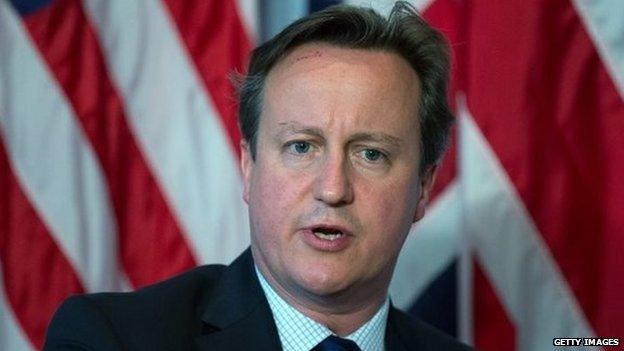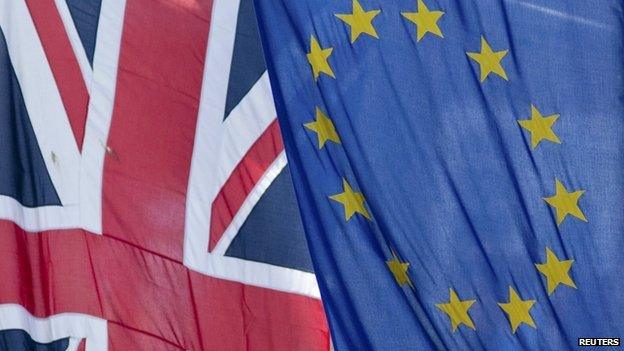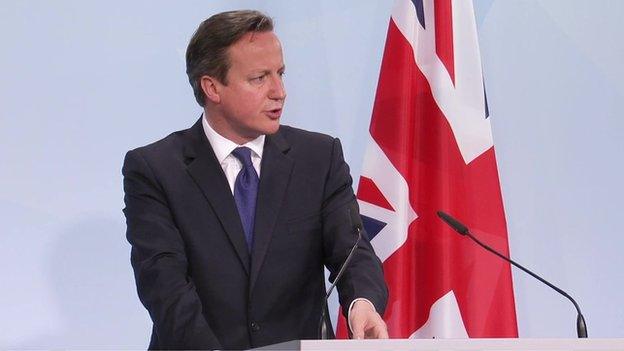The Conservatives' EU battle has already started
- Published

David Cameron has promised an EU referendum by 2017
What is it about the Conservative Party and the European Union? What is it that prompts such passion, such muddle and - on occasion - such bitterness?
The relationship between Britain and the EU tore the Conservatives apart for years in government and in opposition.
David Cameron was elected leader ten years ago on a promise to stop his party banging on about Europe. A decade on the prime minister has got his drum sticks out and is banging his way around Europe. But not all his party is marching to his beat.
Some at Westminster had expected the Tory battle over the EU to be delayed until the time Mr Cameron had negotiated the reforms he wants to see.
Then his MPs would be able to judge whether or not the prime minister had lived up to his promise to reform fundamentally the UK's relationship with the EU. And until then, so it was thought, the Eurosceptics would give him the benefit of the doubt.
But this assumption was wrong and the internal battle within the Tories has begun already. Some MPs are talking openly about putting principle over party.
Others are threatening to vote No in the referendum regardless of the shape of Mr Cameron's reforms.
Easy ride
And this carries risk for Downing Street. One thing that comforted ministers was the idea that the prime minister did not face the same scenario as John Major in the 1990s.
Then Mr Major had to force a piece of legislation through Parliament that gave the EU greater powers, the infamous Maastricht Bill that Tory MPs fought over night after night, amendment after amendment.
Today, so the argument went, there was no such legislation to get bogged down in Parliament and what matters will be convincing the electorate in a referendum.
But this thesis always presumed that the European Union Referendum Bill would get an easy ride through Parliament.

Of course, Labour and the SNP had promised to kick up a stink over the franchise and call for 16 and 17-year-olds to have the right to take part.
The SNP was also going to push for a double majority vote so that Scots could have their own say on whether they should stay in or out of the EU.
But the assumption was that all these demands would be pushed aside by a clear, if small, Conservative majority.
Spending limits
Does that assumption hold true? Will Conservative MPs now give the Bill such an easy ride?
Mr Cameron has angered some Tory Eurosceptics by appearing to suggest that ministers will not get a free vote in the referendum, a suggestion that has descended into some confusion with Downing Street accusing reporters of misinterpreting the prime minister's remarks in Bavaria.
Some Tory MPs are dismayed at what they claim is Mr Cameron's assumption that he will end up arguing to stay in the EU come what may.
Other Tory MPs are up in arms over the government's decision to scrap the so-called "purdah" rule which usually bans the government machine from being used to campaign in the referendum.
And some are worried about the promise to raise the limit on how much each side in the referendum can spend, something they fear could help those campaigning to stay in the EU. And many of these issues are established by the EU Referendum Bill.
So a piece of legislation expected to be relatively straightforward could suddenly become more complicated - if Labour join with some Tory rebels to defeat the government, as happened so often during the passage of the Maastricht bill in the 1990s.
The risk is that all these technical issues about the referendum process offer Eurosceptic Tory MPs the chance to have a proxy battle over the real issue in hand.
MPs begin debating the Bill on Tuesday. Ministers had hoped to rush it through quickly and get it on the statute book by early next year. But they might be in for a longer haul than they had expected.
- Published8 June 2015

- Published30 December 2020
